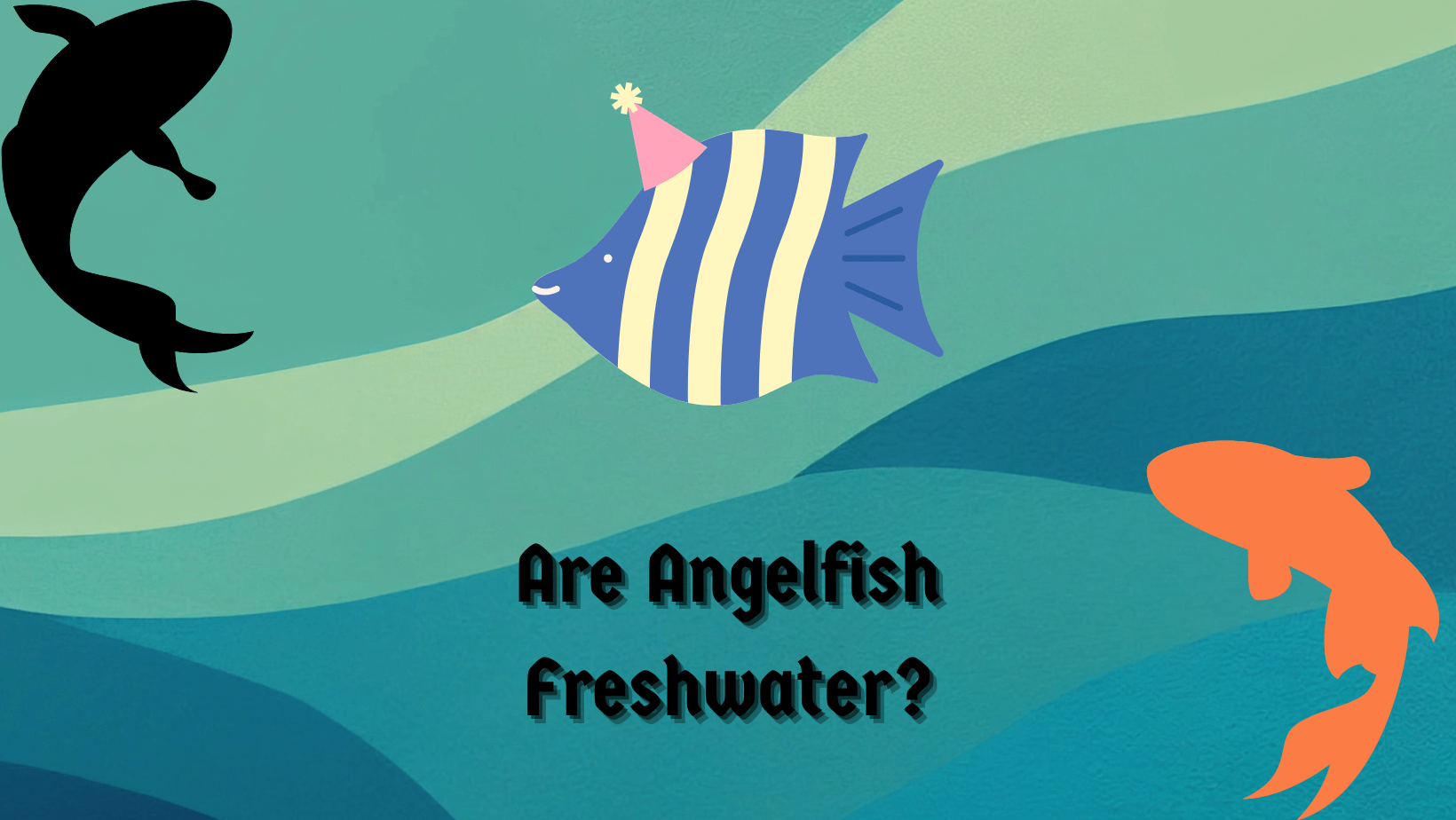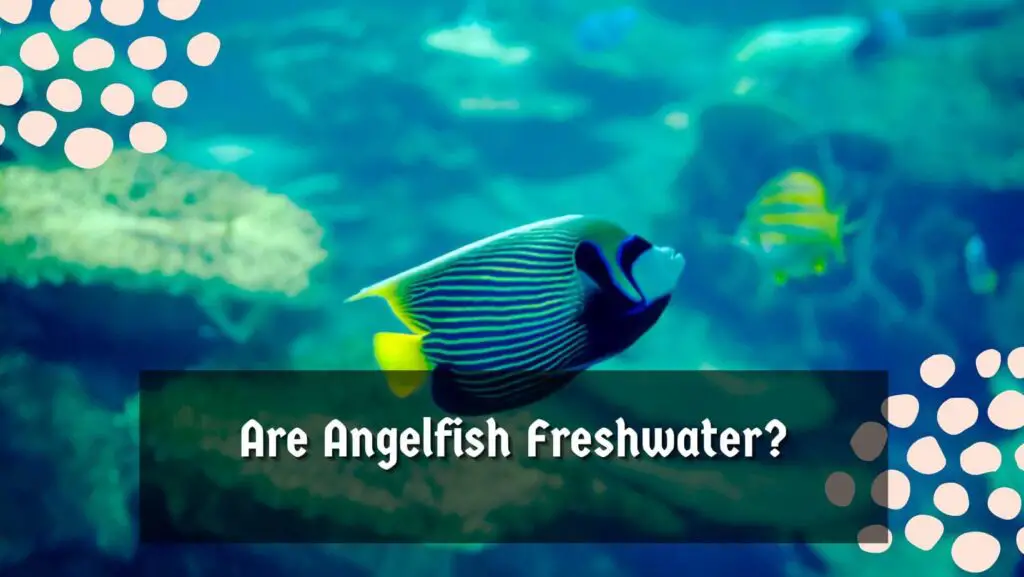
No doubt that Angelfish are fascinating creatures, but if you’re wondering are angelfish freshwater, then you are not alone. In this article, I am not only going to answer ‘Are angelfish freshwater’ but also going to talk about their adaptation to freshwater.
In addition, we’ll learn why Angelfish are freshwater, their physiological adaptation, and how Angelfish adapted to freshwater. Therefore, if you want to explore why you prefer freshwater habitats, read this article thoroughly.
Are Angelfish Freshwater?

Yes, Angelfish are freshwater fish. The lush, freshwater ecosystems of the Amazon River Basin & its tributaries in South America serve as their natural habitat. Hence, their ability to thrive in these environments is a testament to their remarkable adaptation to freshwater conditions.
Since Angelfish are freshwater fish, they thrive in environments with low salt content, like rivers, lakes, or streams. This kind of habitat offers specific water parameters that are essential for the well-being & survival of freshwater fish.
To thrive in freshwater environments, Angelfish have fortunately evolved to adapt to specific conditions. Learning their Natural habitat & the adaptation that makes them perfectly suited for freshwater will help you care for your Angelfish better.
All varieties of Angelfish need specific water conditions to maintain their optimal health & well-being. Some key parameters that can contribute to the preference for freshwater habitats include temperature, pH level, & water hardness. If you want to know about water hardness in-depth, consider reading our article: ‘Are angel fish Hardy.’
Similarly, we have shared an in-depth article on ‘temperature for angelfish‘ and ‘ideal pH for angelfish.’ All this article will provide in-depth insights on angelfish water parameters requirement; however, if you want to know about the temperature requirement, Angelfish like to thrive in a temperature ranging from 75°-82° Fahrenheit, which allows them to maintain their metabolic process and immune system.
On the other hand, they prefer slightly acidic to neutral pH levels, with a range of 6.5 to 7.5. You should note that this pH level should always be maintained all year around for their overall health & successful reproduction.
Since Angelfish adapt well to varying water hardness levels, they usually prefer a moderate hardness of 3-8 dH. This adequate water hardness is essential for their bone development & overall physiological function.
To know more about the requirement and what you can do to improve it, let’s take a quick look at their adaptation to the freshwater environment.
How Are Angelfish Adapted to Freshwater?
Learning about angelfish adaptation to freshwater environments will give you amazing insights into remarkable features that help them navigate their surroundings and maintain their physiological balance.
Yes, to survive & thrive in a freshwater environment, Angelfish have developed several adaptations that can provide you with some valuable insights & knowledge.
Physical Adaptation
Angelfish have successfully adapted physically and behaviorally. Let’s first discuss physical adaptation, which contributed to their success in the freshwater environment.
Gills & Osmoregulation
Angelfish completely rely on specialized gills to extract oxygen from the water & remove carbon dioxide. However, these gills are not only strict to that function. Gills also play a huge role in osmoregulation, maintaining the balance of salt & water within the angelfish body. Our little friends can thrive in freshwater habitats by carefully regulating their internal environment through this adaptation.
Kidneys & Excretion
When you look at the kidneys of an angelfish, you will find something more than its function of excreting waste products & maintaining fluid balance. You should know that these organs are efficient at filtering toxins and byproducts from the angelfish body, ensuring their health in the freshwater environment.
Behavioral Adaptations
Besides physical adaptations, Angelfish have developed behavioral traits contributing to their success in freshwater environments.
Temperature Regulation
If you look at the anatomy of Angelfish, you will find out that they can regulate their metabolic rate in response to changes in water temperature. They can successfully adapt to varying thermal conditions within their freshwater habitats, ensuring their internal systems function optimally.
Camouflage & Coloration
Not only are Angelfish able to regulate their metabolic rate, but they also employ various color patterns as camouflage in their natural habitat. Yes, this kind of pattern helps them blend seamlessly into their environment, which provides ultimate protection from the potential Predator. In addition to this, their bright & vibrant color plays a crucial role in attracting mates during courtship rituals.
Why Are Angelfish Freshwater?

If you want to discover why Angelfish have become freshwater species, you must explore their evolutionary history. Like any other species, these fishes have adapted over time to the benefits provided by freshwater habitats, which have ultimately contributed to their continued survival & proliferation. Therefore, I mention a couple of reasons for Angelfish becoming freshwater species.
Abundant Food Sources
If you check out the water diversity of the earth, you will find that freshwater habitats offer a diverse range of food sources for many creatures & organisms, including Angelfish. While Angelfish are primarily known as omnivores, their diet often includes plant matter and algae in freshwater habitats.
You can find a range of food sources, from plant matter & algae to smaller fish & invertebrates, which Angelfish can easily access. This consumption of vegetation contributes to their overall nutritional balance and digestive health.
In addition to plant matter, Angelfish also exhibit predatory behavior, preying on smaller fish and invertebrates within freshwater ecosystems. These plentiful & varied rich diet food sources in the freshwater ecosystem also play a significant role in angelfish adaptation to the freshwater environment.
Reduced Competition
When you compare freshwater habitats to saltwater environments, you find that saltwater habitats are more crowded for Angelfish than freshwater habitats in most instances.
To reduce competition for resources, territories, and mates, evolution might have allowed our little friends to establish a successful breeding pattern and secure their places in the freshwater ecosystem for continued survival and proliferation.
Behavioral Characteristics
If you notice closely, you will find that Angelfish rely on freshwater habitats for successful breeding. They establish territory, build nests, and protect their offspring until they are old enough to venture independently.
This kind of complex behavior demonstrates their strong connection to a new environment. This might be why Angelfish likes freshwater and chooses to continue its survival in it. Also, Angelfish are known for the social interaction within freshwater communities that differ from schooling fish.
To know more about their social behavior, consider reading our articles on ‘Are angelfish schooling fish.’ You should know that Angelfish exhibit a hierarchical structure where they engage in courtship display, further highlighting their adaptation to the social dynamics of the freshwater ecosystem.
Conclusion
Now you know that Angelfish preferences for freshwater habitats are not mere coincidence. An evolutionary history, physiological adaptation, and behavioral characteristics shaped our little friend into remarkable freshwater species.
After learning so many things, from their specialized gills & kidneys to their complex breeding behavior & physical characteristics, if you want to learn more, consider reading our articles on fun facts about Angelfish.
You should know that Angelfish exemplifies the wonders of nature’s adaptation. Therefore, understanding this factor enriches our knowledge and helps us provide optimal care and create a suitable environment for these beautiful creatures in our aquarium.
I hope you find this article helpful where. I have tried my best to give you in-depth knowledge on ‘Are angelfish freshwater.’ If you find this article helpful, then consider sharing it.
Your share will help many people learn about the true reason behind the physiological adaptation of freshwater angelfish, along with their evolutionary history. Do check my other helpful guide on angelfish care. See you in the next post; till then, take care, and goodbye.

